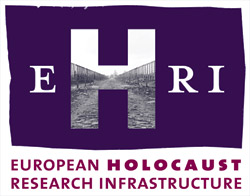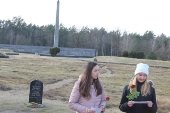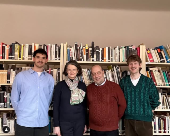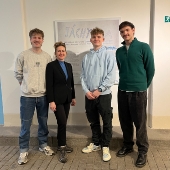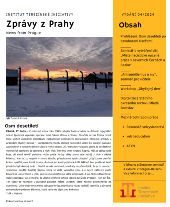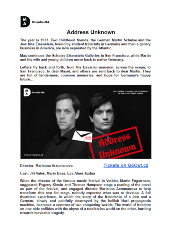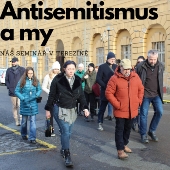Facing Holocaust Today – Rescuing European Jewish and Roma Memories
No. 618256-CITIZ-1-2020-1-CZ-CITIZ-REMEM
Events have been carried out within this project:
Facing Holocaust Today – Rescuing European Jewish and Roma Memories
The project involved 351 citizens, notably 159 participants from Czech Republic, 97 participants from Slovakia, 43 participants from Germany, 18 participants from Austria, 24 participants from Poland, 5 participants from Hungary, 1 participant from Greece and 1 participant from Italy, 3 participants from Ukraine . Non EU citizens: 1 participant from Turkey, 1 participant from Canada.
These events were in following cities: Bremen (DE), Oswiecim, Majdanek, Lublin and Belzec (PL), Bratislava (SK), Prague and Terezín (CZ)
Summary
Preparatory activities
During the preparation of the project, online meetings of the project team were held on a regular basis, but at least once per 3 months. We coordinated program of events, preparation, translation and distribution of the activities and of the on-line publication “Vyhlazení Romů a Sintů / Extermination of Roma and Sinti”.
Team meetings were held at:
- 02/08/2021 Oswiecim – koordination of Event 3, program, activities (Smutná, Waageová, Caban, Voráč)
- 19/04/2022 and 25/07/2022 – Bratislava, managing changes in organisation, planing events and activities acording lockdown changes in 2021-22 to the end of the project, discusing risks and possible solutions (Gabaľová, Keim, Fishbone Vlčková, Brišáková).
- 18/01/2023 – managing changes in realisation and trainers teams planing events and activities of event 5 and 6 (Gabaľová, Ševčíková Waageová, Voráč, Turanská, Keim)
- 25/04/2023 - plan for conference, project evaluation and sustainability (Kraus, Gabaľová, Serota).
Persons responsible for the project:
- Terezin Iniciative Institute – Marie Smutná, Tereza Štěpková, Emil Voráč since February 2022 Dana Gabaľová and Eliška Ševčíková Waageová
- Centropa – Magda Farnesi, since September 2022 Jana Turanská, directors Fabian Gherke and Edward Serota.
- Milan Šimečka Foundation – Michal Keim, Nina Galanská, since January 2022 Veronika Fishbone Vlčková
- Fundacja Strone Dialogu - Joanna Talewicz-Kwiatkowska; Agnieszka Caban
Event 1: Holocaust and Us. Why it is important to preserve the memories of Jews and Roma for future generations. Round table and international seminar for teachers
Participation: The event involved 52 citizens, including 18 participants from Czech Republic,
23 participants from Germany, 10 participants from Slovankia. 1 participant from Austria.
Location / Dates: The event took place 23.-24. January 2021 online and was coordinated from Bremen and Prague. The event was originally planned to be held in person in Bremen from 23.-25. January, but due the COVID-19 related lockdown, it was changed to an online event in the last moment.
Aim: how to use the memories of second-generation survivors when direct witnesses pass away.
Short description: Centropa and the Terezín Initiative Institute jointly prepared an international seminar for teachers from the Czech Republic, Slovakia and Germany. There was great interest in the seminar and the places were filled within a few days. Due to the coronavirus pandemic and the associated measures, the event had to be held online. The main topic of the seminar was how to use the memories of second-generation survivors when direct witnesses pass away. This question was sought to be answered by ITI and Centropa representatives and second-generation representatives who participated in a roundtable that was part of the programme. Despite the challenges associated with the online space, the seminar was able to make it interactive. The most interesting activity was the meeting with Hanuš Hron, born in Czechoslovakia in 1925.
Both Centropa and ITI have an extensive database of Jewish biographies and family photographs that can be well used in teaching. On Saturday, we watched Centropa's film about the fate of Dagmar Lieblová "From Bohemia to Bergen-Belsen and back" and in group work we looked at its use in teaching. Michael Heitz from the Albert-Schweitzer-Schule in Sinsheim presented the Centropa film "Zachor - Remember!", made by his young student originally from Israel, and the participants worked actively with the Czech-German educational exhibition "Lost Memory? Sites of Nazi forced labour in the Czech Republic", which was guided by its author, historian Alfons Adam. Afterwards, in a workshop by Marie Smutná, they focused on the culture of remembrance and memory of the sites. At the end of the first day of the webinar, Prof. Jörg Wollenberg from the University of Bremen gave an information-packed lecture on Nazi forced labour in northern Germany, further post-war developments and his own experiences were discussed.
The second day of the webinar started with presentations of good practice examples from Germany and the Czech Republic - Pablo Arias Meneses and Rudolf Steffens from Rahel-Varnhagen-Kolleg in Hagen and Daniela Vitásková from the Business Academy and Tourism School in Trebic presented their projects. Marie Smutná from ITI led a workshop "The Holocaust and Us" on the use of memories of second-generation Holocaust survivors and then the participants prepared questions for the contemporary witness Hanus Hron. The debate with Hanus was the highlight of the webinar, not only because of the information he shared, but also because of his friendly attitude and sense of humor. Afterwards we took at least a virtual tour of the Valentin Bunker in Bremen Fargo, where the exhibition "Lost Memory" was to be installed. John Gerardu presented his “Spurensuchen” project. The whole webinar was interpreted.
According to the participants, we managed to maintain the interactive character of the event even in this demanding form of the course, and both the content and the formality were very positively evaluated.
From the feedback:
- I would like to thank you all very much for the opportunity to visit at least virtually in the time of covid 2 countries - Czech Republic and Germany. The meeting with you was valuable for me, not only from the point of view of a teacher, but also as a person who is interested in the history of the 20th century. The program was excellent, the guests were also excellent, the division into groups was super...
- Very nice and beneficial event! I enjoy having conversations with teachers from other countries.
- Thanks to the varied programme and the successful alternation of films, presentations, lectures and especially workshops in groups, the event was very good. The exchange of experience between Czech, Slovak and German teachers was great. Thank you again for the opportunity to attend the seminar.
- On a side note: very useful experience to be on the other end of the online "tutorial" for two days. I understand my students a little better how difficult it is to concentrate in a home environment.
- As a very positive event where I learned a lot of new information. Every lecture, presentation of projects from other colleagues from Czech Republic, Slovakia and Germany, made me think how to use the input for my work:-) I think that a face-to-face meeting would have been certainly more pleasant and more stimulating, but even in these conditions it was very nice and I am glad that I could attend. I also found the round table that took place before the conference very useful. I was a bit worried about the language barrier, but thanks to the great interpreters it was no problem at all, even Google translator worked very well:-)
- I was very satisfied with the seminar. I was glad to meet my German colleagues, because I could see with my own eyes and hear with my own ears how they approach the issue of the Holocaust and what they do with their students. For me, ten stars out of ten:-)
- A seminar that brought many new perspectives on Czech-German-Slovak relations, a packed programme, very well prepared organisers, great participants, I saw many familiar faces again. Anytime would call for a repeat, but in a more presentable form, perhaps as an ITI Summer School?
- The seminar was inspiring because it is always enriching to compare experiences with colleagues from other schools and countries. Lots of quality material, very dense workshop on information. Well organized, adherence to timing, excellent moderation and fine interpretation.
- Extremely interesting projects by colleagues from Germany and the Czech Republic. How else can one talk about the history of a region/city.
Event 2: Summer school Holocaust and us.
Participation: The event involved 53 citizens, including 43 participants from Czechia 14 from the city of Prague and 27 from city of Chodov, 2 participants from the city of Humenné and Bratislava (SK), 4 participants from the city of Wien and Linz (A), 1 participant from the city of Bremen (DE) and 3 participants were refuges from Ukraina.
Organised by Terezin Initiative Institute
Event 2.1: Unconventional summer school Holocaust and us. Why it is important to preserve the memories of Jews and Roma for future generations
Participation: The event involved 20 EU citizens, including 15 participants from Czech Republic,
2 participants from Slovakia and 2 participants from Austria and one participant from Germany.
Location / Dates: The event took place in Oswietim, Poland, from 29/7/2021 to 02/08/2021
Aim: Visiting memorials, work with stories of survivors.
Short description: The event was split in two actions. A non-traditional school for educators (Event2) and a visit to a place of memory and the summer school with workshops about remembrance with young people and their families from the Roma community in Chodov (Event 6).
An unconventional international summer school for educators and students in Auschwitz was organized by the Terezín Initiative Institute. Participants first took a guided and self-guided tour of the Auschwitz I and Auschwitz-Birkenau Museums and then worked in groups to prepare their own educational program for pupils and students.
This was a kind of creative workshop in which the participants - twenty educators, students, historians, lecturers and members of the second or third generation - first sought together to find a way to sensitively present the story of the tragic place of memory in Auschwitz to young people.
The tours of the camp were followed by reflection and group work, concluding with a debate on how to prepare a meaningful programme for young people, how to guide the preparation and how to reflect with young people on the visit to such a tragic place of memory, how to incorporate the anniversary into Holocaust education and how to link history with the present.
Part of the summer school was participation in a commemorative act in remembrance of the liquidation of the so-called Gypsy camp on the night of 2 to 3 August 1944 and on the occasion of International Romani Holocaust Day. We visited the Jewish Museum and Synagogue in Auschwitz, where we saw the Oszpicin exhibition. #Historia żydowskiego Oświęcim”, which is dedicated to the history of the Jewish community in Auschwitz, and the permanent exhibition at the headquarters of the organization “Stowarzyszenie Romów w Polsce: Romowie Historia i Kultura”,
The different perspectives and experiences that the individual participants brought to the summer school, whether from the position of teachers, parents, students or members of a minority that was persecuted during the Holocaust and is still discriminated against in society, contributed to mutual enrichment, but also opened up many questions.
The summer school for teachers was followed by a summer school for youth from the excluded locality in Chodov in western Bohemia (Event 6).
From the feedback:
What was beneficial for you?
- Just meeting like-minded people. Contacts that help me organize my work better are very valuable to me. The visit to Mr. Kwiatowski and the Roma Museum was beneficial. In hindsight, I find that the programme was well thought out and built on each other. Even though I have visited Auschwitz several times, there is still much to learn.
Event 3: On-line conference Facing Holocaust Today on the occasion of the 80th anniversary of the publication of the so-called Jewish Codex in Slovakia
Participation: The event joined 78 EU citizens, including 52 participants from Slovakia, 11 participants from Czech Republic, 6 participants from Germany, 4 participants from Poland and 1 participant each from Austria, Italy and Greece. The online conference joined also 1 person from Canada and 1 from Turkey.
Location / Dates: The event took place in online from 09/09/2021 to 11/09/2021
Aim: how to work with significant anniversaries in education.
Short description: Even we planed the seminar in the beginning of September we had to carry out the program online due to covid19 restrictions.
During the seminar, through the methods of pedagogical constructivism, teachers learned how to work with significant anniversaries in education and how to deal with polarizing topics among students.
The event was coordinated by Milan Šimečka Fondation (Slovakia). The round table and the seminar were translated in Slovak and English.
Topics and guests:
- "Antisemitism Then and Now" - Miloslav Szabó, Comenius University, Slovakia
- "The Jewish Code and its legacy for today" - Pavol Makyna, Institute of the Memory of the Nation, Slovakia
- "Oral history method" - Monika Vrzgulová, Institute of Ethnology, Slovak Academy of Sciences, Slovakia
- "The theme of the Holocaust in formal and non-formal education" - Tomáš Filip, teacher at St. Edith Stein Gymnasium Košice, Slovakia
- "Hoaxes, disinformation and conspirators" - Vladimír Šnídl, Denník N, Slovakia
- "Developing critical thinking in yourself and in the classroom" - Hana Skljarszka, Academy of Critical Thinking, Slovakia
- "Inclusive History" - & Tereza Štepková, International Holocaust Remembrance Alliance
- "What we tend to forget when teaching about the Holocaust" - Michala Lônčíková, Institute for Contemporary History of the CAS
- "Dear Mr. President - reading and sources as a teacher's tool" (Letters to Tiso - Madeline Vadkerty, & A. Śniežko
- "Roma Holocaust" - Michal Schuster, Terezín Initiative Institute, Czech Republic
- "Holocaust Survivors Today" - Eva Mosnáková, Holocaust Survivors Club, Slovakia
- “Stories that Move” - N. Galanská, P. Dráľ , Nadácia Milana Šimečku
- A. Návojský
- P. Vanko:
- M. Bažantová:
- L. Zorád
Online recording
All contributions of the main programme in high resolution uploaded. The contribution of Nina Galanská and Petr Dráľ about the on-line tool Stories That Move was evaluated as the most useful for pedagogical practice, closely followed by Vladimír Šnídl "Hoaxes, disinformation and conspirators", Monika Vrzgulová "The method of oral history" and Andrej Návojský "The Holocaust ...
From the feedback:
- The most beneficial for me was the clarification of some concepts, specific activities for teaching, a guide applicable in teaching. Very interesting contributions with an overlap into teaching practice.
- Most beneficial was the meeting with the contemporary witness, who followed up on the recommendation of the book We Saw the Holocaust.
- The best contributions can be put to good use in the classroom with students.
- P. Mosnakova - survivor narratives are always helpful and enriching. I was not familiar with “Stories That Move”, which was new to me. I chose from the Seredi Museum's offerings and will definitely go with my students.
- New information immediately usable in practice, I was interested in how the Slovaks dealt with the period of the Slovak state, there was a very interesting post about a gypsy family, but I forget what it was called, for me the most important thing was the human overlap = history is made by people and people intervene again.
- Some of these contributions have given me the opportunity to learn about new methodologies useful for my teaching.
Event 4: Facing Holocaust Today – Rescuing European Jewish and Roma Memories
International Seminar for Teachers and Youth - Anniversary of 26 October (liquidation of Roma and Sinti in the Belzec extermination camp in 1940)
Participation: The event joined 53 EU citizens including 21 participants from Czech Republic, 7 participants from Slovakia, 5 participants from Hungary, 19 participants from Poland and 1 participant from Austria.
Location / Dates: The event took place in Majdanek, Lublin and Belzec from 25/10/2021 to 28/10/2021.
Aim: Guided wisits in memorials, a commemoration for the Roma and Sinti murdered in Belzec, workshops. The group of pupils explored the history and culture of the Romani ethnic group and discussed in small groups how to confront hatred.
Short description: On the occasion of commemorating the Roma and Sinti murdered in Belzec in 1940, during the existence of a labour camp for Jews, Roma and Sinti, an international seminar for teachers and students was held in Belzec, Majdanek and Lublin from 25 to 28 October 2021. More than 50 participants from the Czech Republic, Poland, Slovakia, Hungary and Austria took part.
In addition to a visit and tour of the Belzec extermination camp and Majdanek concentration camp, a commemoration for the Roma and Sinti murdered in Belzec took place on 26 October 2021 in the presence of the director of the Museum and Memorial in Bełżec at the memorial built in 2012.
The workshops focused on the Holocaust of the Roma and Sinti.
Among other things, the group of pupils explored the history and culture of the Romani ethnic group and discussed in small groups how to confront hatred and what preconditions a common future must have so that society does not again go down the path of hatred leading to extermination. The different groups presented different proposals for solutions on what a future without hatred and prejudice could look like.
Małgorzata Kołaczek, PhD, from the Faculty of International and Political Studies at Jagiellonian University in Krakow, presented to the group of teachers and educators how discrimination and marginalization of the Roma is perceived by them, spoke about the history of "Romophobia", i.e. the negative perception of the Roma in society, the workings of prejudice, the process of recognizing the Roma Holocaust and the long-term process of compensating them.
The seminar was organized by the Terezín Initiative Institute and Fundacja w Stronę Dialogu with the support of Centropa Budepast and the Milan Šimečka Foundation.
Publications Agnieszka Caban, Małgorzata Kołaczek: The Extermination of the Roma and Sinti possible download in Polish, Hungarian and Czech (pdf).
From the feedback:
- I consider the most important thing is that the seminar took place in places connected with the tragedies of the Second World War and not online, the possibility to personally be in the places authentically and try to imagine the unimaginable.
- I really did not expect what I experienced here. I plan to come back here and show it to my friends.
- I realized the uniqueness of the event - mainly the distance of the places from the Czech Republic. I appreciate the opportunity to participate in the memorial service in Belžec, the visit to the monuments in Belžec and Majdanek, and the group of participants - adults, students, participants from different countries, representatives of the Roma.
- I liked working with representatives of the Polish and Czech Roma communities. Both camps were of great value to me. Good translation and interpretation. As a member of a student group, I think that children could work more in such a group in the future.
- It was important to work with the symbolism of memorial places, the presence of Roma, finally about them with them, and mixed groups of students - teachers, a space to experience and reflect together.
- A lot of new information. The most important things - propaganda, the perception of the majority society, the Roma in the world.
Event 6: Holocaust and Us. Traces of History in Public Space. Teacher training
The event joined 37 EU citizens including 26 participants from Czech Republic, 5 participants from Slovakia, 3 participants from Germany and 3 participants from Austria.
Location / Dates: The event took place in Prague and Terezín (CZ) from 16/03/2023 to 19/03/2023.
Aim: The activities were designed to help the participants to understand different dimensions of the Holocaust, in particular regarding different victims’ groups – Jews and Roma, and diferent groups of jewish prisoners in Terezín (Czech, Germany, Austria, the Netherlands, Denmark, Slovakia and Hungary) and their relationships.
Short description: The aim of the event was to explore and discuss traces of history in public spaces. The activities were designed to help the participants to understand different dimensions of the Holocaust, in particular regarding different victims’ groups; in general (Holocaust of Roma) or the reasons for the deportation of Jews from different countries to Terezín, and their fate in the Ghetto of Theresienstadt as well as further deportations.
First activity was to discuss the reasons why it is important to teach about the Holocaust and what goals do participants want to achieve, when teaching about the Holocaust in their schools or in their organisations.
A key activity of the seminar was a day trip to the city of Terezín, including a guided tour of the memorial side in the Small Fortress. Further the participants were able to visit the Ghetto museum and the Magdeburger barrack.
In Terezín the participants had the opportunity to talk and discuss the life circumstances of Czech Jews by Mr. Tomáš Kraus, second generation survivor. Further Mr. Thomas Elmecker provided the participants with information about the different reasons for deportations and “realities” in the Ghetto Jews from Germany, Austria, the Netherlands, Denmark, Slovakia and Hungary faced.
In one activity, the MemoGIS application was introduced to the participants. During a walk through Prague's Old Town, the MemoGIS app was used to reconstruct different lives and incidents of Jews. Using the app, the participants were able to explore where Jewish life existed and, above all, where it was restricted by laws and punishments were imposed for violating them. Another activity involved working with original documents from archives, as well as the history of the former Jewish folk school in Jáchymova Street.
From the feedback:
- I take away a great experience, new knowledge, great inspiration and the need to convey more about the topic of the Holocaust to students and those around me. The topic is still alive. A lot of information was new.
- I will want to incorporate internet and database searches, photo and film demonstrations and subsequent work with them into the teaching.
- I will use the materials and links in the lessons. Group work, cross-subject overlap, visual and phonetic dramatization based on viewing period materials, and students' visual experience will be important.
- Furthermore, I would like to learn about the past from authentic materials, see and draw motivation to improve interpersonal relationships in the present.
- Everything about Jáchymka [the former Jewish school in Prague] and the MemoGIS application was new to me. Every encounter like this gives me an AHA! - Here information from Thomas [about the Jews who were deported to Terezín from Denmark, Germany, Austria, Slovakia] and the narration of Mr. Kraus.
- What do I take away from the seminar? Today we have everything we need. We have an abundance of everything. People didn't have that during WWII. Everything I learned I passed on to the children right after my arrival [...]
Event 2.2: Summer school - the liquidation of the so-called Gypsy camp in Auschwitz. The Roma Holocaust in Czechia and Slovakia.
Participation: The event involved 32 EU citizens, including 30 participants from Czech Republic – 28 from city of Chodov and 2 from Prague, 2 from the city of Linz (A)
Location / Dates: The event took place in Chodov (CZ) from 28/09/2022 to 29/09/2022
Location / Dates: The event took place in Chodov, Czech Republic, from 28/04/2023 to 29/04/2023
Short description: We had to postpone the visit of commemorative act in Auschwitz until after the end of the project. The workshops and lesson of the “Summer school” were held in place of the NGO Khamoro in Chodov. Participants included youth and adults from the Romani community tied to the center.
We focused on the history of the Romani Holocaust in the Czech Republic and also Slovakia, because the families of most of the participants are from Slovakia. The program was mainly interactive, using memories of Slovak witnesses, and we used films and recordings from the methodology for the publication (NE)BOLÍ (People in Need) and Holocaust ne(bol) (Milan Šimečka Foundation). Some of Khamoro members become educators of Terezin Initiative Institute.
From the feedback:
- My family comes from eastern Slovakia, but I didn't know anything about the persecution of Roma in Slovakia, how it happened.
- When I listened to the lady's memories, I cried. It's terrible what happened to her.
Event 5: Holocaust and Us. Different narratives of the Holocaust in remembrance and education.
Participation: The event joined 55 EU citizens 29 participants from Czech Republic, 8 from Slovakia, 10 from Germany, 7 participants from Austria and 1 from Poland.
Location / Dates: The event took place in Prague, Czech Republic, from 27/05/2023 to 30/05/2023
Aim: The aim of the event was to put the spotlight on Europe's recent common past and learning about how the narrative regarding the Holocaust is or has changed over time in different countries.
Short description: The aim of the event was to put the spotlight on Europe's recent common past and learning about how the narrative regarding the Holocaust is or has changed over time in different countries. The history was brought to life through personal stories and testimonies of descendants of people and witnesses who were excluded from society because of their Jewish or Roma origin and persecuted by Nazi racist policies during the Second World War.
The introductory discussion addressed the question Why teach about the Holocaust? This gave the participants, teachers and students, the opportunity to get different perspectives from the other participants while presenting their own views to the group.
A key activity of the conference was a panel discussion on "Changing the Narrative and Teaching of the Holocaust in Place and Time", where guests from academia and teaching practice presented their experiences.
The invitation for the panel discussion was accepted by:
- Fabian Rühle, head of the German office of Centropa (DE),
- Andrej Herzeg, teacher at a secondary school and lecturer of “The Holocaust as a tool of attitude education” e-learning course (SK),
- Táňa Klementová, former lecturer at the Brno branch of the Jewish Museum in Prague and cooperated with the Museum of Romani Culture on Holocaust-themed programs and exhibitions (CZ),
- Agnieszka Caban, author of articles, reports, books on Romani history and culture and currently president of the “Dom na Pograniczu“ (“Border House”) Foundation (PL).
Přepis panelové diskuse najdete zde
Furthermore, guests from the Jewish and Roma communities shared their memories not only of their ancestors, but also how they talk about the Holocaust, how they commemorate it in their families and community, and how they perceive the way the Holocaust is commemorated by mainstream society. Mr. Tomáš Kraus (from the second generation of the Jewish community) and Ms. Jana Kokyová (from the third generation of the Romani community) accepted the invitation to the talk.
The program also included the launch of a traveling version of the exhibition "MemoMAP. History of the Holocaust in Prague". The exhibition presents cases of persecution of Jews on the basis of the Nuremberg Laws and related decrees in Prague, but similar regulations and punishments applied everywhere in the Protectorate and the Reich.
In addition to the exhibition itself, the participants learned about the integration and segregation of Jews in Prague through the MemoGIS application and were shown how to use it for other cities.
Further activities included a workshop from Centropa, Ms. Jana Turanská, on how to work with audio and video materials (interviews) of contemporary witnesses, a guided visit to the Pinkas synagogue and the Old Jewish cemetery in the former Jewish quarter of Prague.
The last activities were the creation of a lesson plan based on the presented topics and methods, as well as the dramatisation of the history of the Holocaust through short plays based on eyewitness accounts.
From the feedback:
- I realized the importance of the topic of the Roma holocaust and the importance of teaching this topic comprehensively - not to rely on books, but to base the lessons on people's personal tragedies, so that they realize that it is not about numbers, but about real people.
- For me, an important realization is the fact that it is necessary to keep talking about the topic of the Holocaust and really go into details → use personal stories... and various other interesting approaches and methods in teaching. Special focus on the Roma HOLOCAUST.
- Most likely, there is also a Roma holocaust (I heard it here for the first time, I think it should be talked about more) • Interesting format of teachers + students, I have not yet dealt with the Holocaust in the Czech Republic, I gained new knowledge.
- There are probably many of us who are interested in the same topic, we just don't know each other. There is still little awareness of the Roma Holocaust.
- Awareness of the neglect of the Roma Holocaust, how much the teacher and his methodology matter. The need for discussion on this topic, all the more so in our region with a large Roma minority.
- We dedicate an hour of Czech to a presentation to our classmates and we will also do some activities with them.
Partneři projektu:



![]()
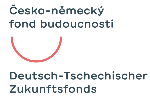
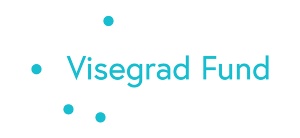
Yesterday, together with the participants of the seminar and excursion Bergen-Belsen on the Threshold of Freedom, we attended a reception at the British Embassy in Prague on the occasion of the 80th anniversary of the liberation of the Bergen-Belsen concentration camp by the British Army on 15 April 1945.
Anne Frank and thousands of others. We visited the place where the fate of one of the world's most famous stories came to an end, as well as that of countless of others. The Bergen-Belsen camp was burned down after the war, but one can still hear echoes of the past. How can we learn about the horrors that have gone to ashes?
Yesterday, we welcomed Director Denise Quistorp and Sebastian Halbauer from the Austrian Cultural Forum in Prague to our premises at Jáchymova to exchange views on our respective activities and projects. This gave us the opportunity to identify common priorities in our work and to further strengthen Austro-Czech exchange through future cooperation.
This week we received a visit from Ms Krejcova (Foreign Culture of Lower Austria) and Mr Halbauer from the Austrian Cultural Forum Prague, where we were not only able to present the work of the ITI, but also make personal contacts. We were able to discuss many topics that overlap with the work of our three institutions in order to promote Austrian-Czech exchange.
The MA Theater would love to cordially invite you to the Prague premiere of the theatre play Address Unknown, based on the 1938's best selling book by Kathrine Kressmann Taylor. The MA Theater's performance is taking place on the 28th of January at 7:30 PM at Divadlo Na Prádle, Besední 487/3, Prague 1. The play is performed in English.
You can learn more about the play here or in the attachment.
The year is 1933. Two childhood friends, the German Martin Schulse and the Jew Max Eisenstein, bound by student fraternity in Germany and then a gallery business in America, are now separated by the Atlantic. Max continues the Schulse-Eisenstein Galleries in San Francisco, while Martin and his wife and young children move back to native Germany.
Letters fly back and forth, from the Bavarian mansion, across the ocean, to San Francisco, to dear Maxel, and others are sent back to dear Martin. They are full of tenderness, common memories, and hope for Germany's happy future...
Direction: Marianna Arzumanova
Cast: Mario Baas, Jiří Valeš, Eva Alner
The original script, direction, scenography and soundtrack are work of Marianna Arzumanova, the director and founder of Prague's Theatre MA. The show premiered on 18th July 2022 in Verbier, and was shown again in London, New York, Geneve and Schloss Elmau, starring world-renowned pianist Evgeny Kissin and baritone Thomas Hampson.
From December 6 to 8, 2024, we hosted the seminar Antisemitism and Us in Terezín for teachers and peer educators from the Anne Frank Youth Network (AFYN). The event was organized in collaboration with European Practitioners against Antisemitism (EPNA), and with support from the German Federal Foreign Office.
Program and Key Speakers
The seminar offered a rich program focused on how to teach about antisemitism and the Holocaust in a way that has a tangible impact while avoiding unintended antisemitic outcomes. We were honored to welcome outstanding speakers:
- Tomáš Kraus, who guided participants through the authentic environment of the Terezín ghetto, sharing his family’s stories to enrich the educational experience.
- Jakub Drábik, who gave a lecture titled What is Fascism?, exploring its origins, manifestations, and methods of prevention.
- Peter Weisenbacher, who presented FRA research and additional data on how antisemitism is perceived and experienced by members of the Jewish community in Slovakia.






